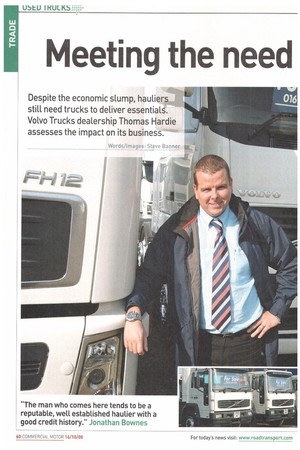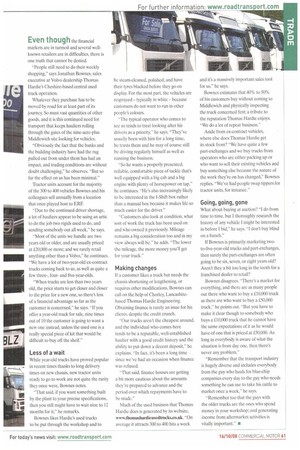Meeting the need
Page 60

Page 61

If you've noticed an error in this article please click here to report it so we can fix it.
Despite the economic slump, hauliers still need trucks to deliver essentials. Volvo Trucks dealership Thomas Hardie assesses the impact on its business.
Words/images: Steve Banner Even though the financial markets are in turmoil and several wellknown retailers are in difficulties, there is one truth that cannot be denied.
"People still need to do their weekly shopping," says Jonathan Bownes, sales executive at Volvo dealership Thomas Hardie's Cheshire-based central used truck operation.
Whatever they purchase has to be moved by road for at least part of its journey. So must vast quantities of other goods, and it is this continued need for transport that keeps hauliers rolling through the gates of the nine-acre-plus Middlewich site looking for vehicles.
"Obviously the fact that the banks and the building industry have had the rug pulled out from under them has had an impact, and trading conditions are without doubt challenging," he observes. "But so far the effect on us has been minimal."
Tractor units account for the majority of the 300 to 400 vehicles Bownes and his colleagues sell annually from a location that once played host to ERE "Due to the continued driver shortage, a lot of hauliers appear to be using an artic to do the job two rigids used to do, and sending somebody out all week," he says.
-Most of the units we handle are two years old or older, and are usually priced at £20,000 or more; and we rarely retail anything other than a Volvo," he continues. "We have a lot of two-year-old ex-contract trucks coming back to us, as well as quite a few three-, fourand five-year-olds.
"When trucks are less than two years old, the price starts to get closer and closer to the price for a new one, so there's less of a financial advantage so far as the customer is concerned," he says. "If you offer a year-old truck for sale, nine times out of 10 the customer is going to want a new one instead, unless the used one is a really special piece of kit that would be difficult to buy off the shelf."
Less of a wait
While year-old trucks have proved popular in recent times thanks to long delivery times on new chassis, new tractor units ready to go to work are not quite the rarity they once were, Bownes notes.
"That said, if you want something built by the plant to your precise specifications, then you still might have to wait nine to 12 months for it," he remarks.
Bownes likes Hardie's used trucks to be put through the workshop and to be steam-cleaned, polished, and have their tyres blacked before they go on display. For the most part, the vehicles are resprayed typically in white because customers do not want to run in other people's colours.
"The typical operator who comes to see us tends to treat looking after his drivers as a priority," he says. "They've usually been with him for a long time, he trusts them and he may of course still be driving regularly himself as well as running the business.
"So he wants a properly presented, reliable, comfortable piece of tackle that's well equipped with a big cab and a big engine with plenty of horsepower on tap," he continues. "He's also increasingly likely to be interested in the I-Shift box rather than a manual box because it makes life so much easier for the driver."
"Customers also look at condition, what sort of work the truck has been used on and who owned it previously. Mileage remains a big consideration too and in my view always will be." he adds. "The lower the mileage, the more money you'll get for your truck."
Making changes
If a customer likes a truck but needs the chassis shortening or lengthening, or requires other modifications, Bownes can call on the help of Charley, Lancashirebased Thomas Hardie Engineering. Obtaining finance is rarely an issue for his clients, despite the credit crunch.
"Our trucks aren't the cheapest around, and the individual who comes here tends to be a reputable, well-established haulier with a good credit history and the ability to put down a decent deposit," he explains. "In fact, it's been a long time since we've had an occasion when finance was refused.
"That said, finance houses are getting a bit more cautious about the amounts they're prepared to advance and the period over which repayments have to be made."
Much of the used business that Thomas Hardie does is generated by its website, www.thomashardieusedtrucks.co.uk. "On average it attracts 300 to 400 hits a week and it's a massively important sales tool for us." he says.
Bownes estimates that 40% to 50% of his customers buy without coming to Middlewich and physically inspecting the truck concerned first; a tribute to the reputation Thomas Hardie enjoys, "We do a lot of repeat business."
Aside from ex-contract vehicles, where else does Thomas Hardie get its stock from? -We have quite a few part-exchanges and we buy trucks from operators who are either packing up or who want to sell their existing vehicles and buy something else because the nature of the work they're on has changed," Bownes replies. "We've had people swap tippers for tractor units, for instance."
Going, going, gone
What about buying at auction? "I do from time to time, butt thoroughly research the history of any vehicle I might be interested in before I bid," he says. "I don't buy blind on a hunch."
If Bownes is primarily marketing twoto-five-year-old trucks and part-exchanges, then surely the part-exchanges are often going to be six, seven, or eight years old? Aren't they a bit too long in the tooth for a franchised dealer to retail?
Bownes disagrees. "There's a market for everything, and there are as many people out there who want to buy a £10.000 truck as there are who want to buy a £50,000 truck," he points out. "But you have to make it clear though to somebody who buys a £10,000 truck that he cannot have the same expectations of it as he would have of one that is priced at £50,000. As long as everybody is aware of what the situation is from day one, then there's never any problem."
"Remember that the transport industry is hugely diverse and includes everybody from the guy who hauls for blue-chip companies every day to the guy who needs something he can use to take his cattle to market once a week," he says.
"Remember too that the guys with the older trucks are the ones who spend money in your workshop; and generating income from aftermarket activities is vitally important." •
















































































































































































